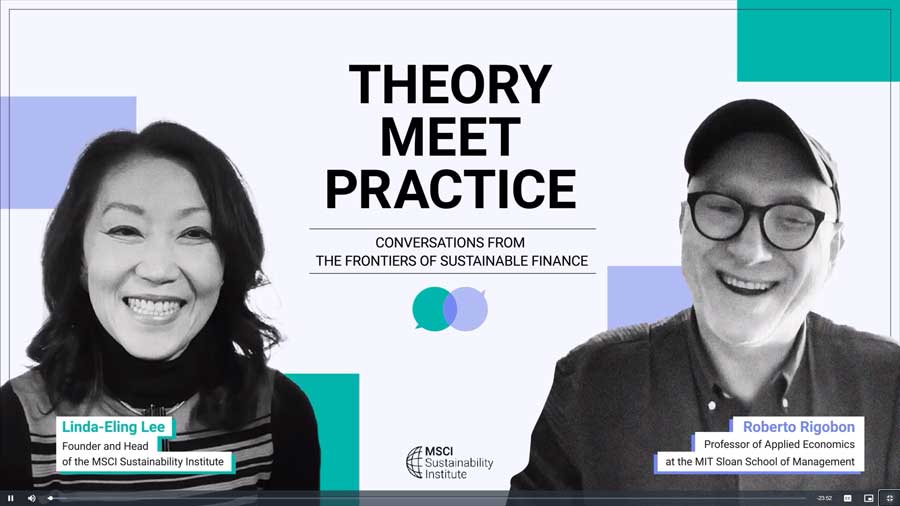Episode 2: Alex Edmans on thinking rationally about sustainability
If you’ve wondered why the acronym ESG has created such consternation, this is your episode! We dive into the need for rationality in sustainable investing with Alex Edmans, a professor of finance at London Business School. Professor Edmans shares his thinking about the challenges to sustainable investing and the importance of surfacing real drivers of long-term value. He discusses faults in research and logic that can trip investors and policymakers, as well as the value of questioning sustainability and the need for granularity and clarity in decision-making. We also learn why academic survey papers make for good reading if you’re stranded on a desert island.
How did ESG go from a three-letter acroynym to a four-letter word? In part thanks to irrationality, suggests Alex Edmans, a professor of finance at London Business School, who joined me recently on “Theory Meet Practice” to explore what he terms “rational sustainability,” which considers all factors that create value regardless of whether they fit within an ESG label.
“
Alex Edmans shares his desert island paper
What academic paper on sustainable finance (besides one of his own) would Alex Edmans want with him if stranded on a desert island? “I would take any type of survey paper,” he says, citing “ESG and Responsible Investing Around the World,” a critical review by Pedro Matos, a professor of business administration at the University of Virginia, published in 2020, and “Sustainable Finance and ESG Issues – Value versus Values,” an address by Laura T. Starks, a professor of business at the University of Texas, published last year. “Both of them are really good sources that not only would I take to a desert island but that your viewers might find useful bits of information in as well.”
As Professor Edmans sees it, the term ESG has created such consternation partly because some its champions have pursued rickety research to assert that ESG factors improve long-term financial returns while elevating sustainability over factors that may tie more specifically to long-term performance.
“They don’t disentangle correlation and causation, and they might measure ESG in rather flimsy ways,” says Edmans of those who succumb to irrationality. “If you’re an investor, you get more brownie points if you engage on ESG rather than issues such as capital allocation, productivity and innovation.”
The objectives subsumed within the handle ESG can conflict with one another as well. Some investors, Edmans notes, may conclude that the best way to improve society would be to buy shares in tobacco companies and use the leverage to persuade them to lessen the harm caused by their products. Other investors eschew tobacco stocks entirely.
Or investors may conclude that some social and governance risks can impact a company’s financial returns, whereas some environmental risks may extract zero cost. “It may well be that you can invest in some high-emitting firms that generate a lot of carbon emissions, which ultimately does improve your returns rather than being at the expense of returns, because we don’t yet have sufficient government action on climate change,” he observes.
As the examples suggest, irrationality can creep in, warns Edmans, when investors lose sight of what they hope to learn from ESG factors in the first place or discuss risk divorced from pricing. “It may well be that a company is exposed to transition risk, but because the price already incorporates that, then it doesn’t necessarily make it a bad investment,” he notes.
Beware weak correlations… or of fixating on the wrong things
Investors can avoid irrationality in sustainable investing by insisting on evidence, stresses Edmans, whose research has also examined the tie between diversity and corporate performance. In one example, Edmans and his co-authors used proprietary data based on manager ratings of the best U.S. companies to work for to show that specific measure of diversity, equity and inclusion (DEI) correlated positively with key measure of future profitability and innovation but no link between DEI and risk-adjusted stock returns.
The finding shows that “we need a much broader set of measures” than the measures of demographic diversity that companies have traditionally focused on, says Edmans. Edmans has also cited a proposal by the UK’s Financial Conduct Authority to regulate the diversity of companies’ workforces as a means of ensuring the fair provision of services to customers as an example of means unconnected to ends and a reminder of the point of regulation.
If a regulator aims to promote equality of access to financial services, it should regulate and measure the fair provision of financial services, which differs from diversity, suggests Edmans, who notes that “you could have a majority white male set of employees who understand the importance of fair provision.” The point, says Edmans, is to insist on the evidence that supports the link between an activity and its outcome.
Edmans says he welcomes the recent finding of a recent survey by Stanford University and the MSCI Sustainability Institute that more than three-quarters (77%) of the world’s biggest investors think that sustainability performance is industry-specific; that water stress, for example, may matter more to a manufacturer of semiconductors than to an insurance company.
The finding suggests that investors are “looking at [sustainability] on a more granular basis rather than one size fits all,” observes Edmans, who recommends more granularity still, citing the retail industry as an example. “There are some companies that might be luxury companies that care more about product quality and innovation, while others may care more about cost control,” he notes.
Investors might also want to be mindful of the danger of fixating on the wrong things. “Information can never have negative value because you can always choose to discard it, but in reality, this is not how things happen,” says Edmans, citing quarterly earnings that can distract investors from paying attention to long-term performance, or standardized test scores that people can focus on at the expense of a broader education.
The same goes for sustainability. “I don’t mind whether rational sustainability becomes the term that replaces ESG, or never even becomes a term,” says Edmans, “so long as when people practice sustainability, they practice it in a rational way.”


